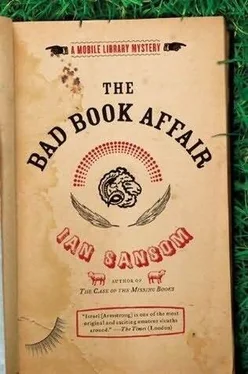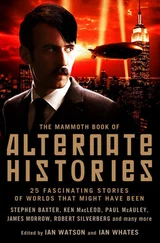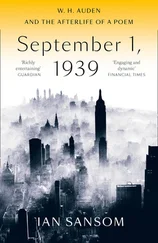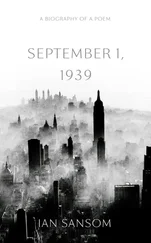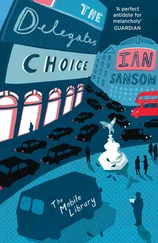Through the window he studied blurrily the big plastic signboard above the counter. The Venice Fish Bar was the kind of fish and chip shop where fish and chips were just the beginning, the prelude to a big concerto grosso of battered fish and fast foods. As well as fish and chips it did burgers, pizzas, kebabs, and curries. Basically, if it was bad for you, the Venice Fish Bar did it: if you could batter crack cocaine, or just deep-fry salt and sell it, then the Venice Fish Bar would have done it. This was not Off Main Street.
He watched the women inside, serving. They wore red baseball caps and red polo shirts, and they were all pale white, discolored by the exposure to spitting fat, and they looked bored almost to the point of self-destruction, as though they had become their baseball caps and red polo shirts, mere chip shop automatons, like machines assembling food, moving slowly from the counter to the cash register, and from the deep fat fryers to the griddles. It was not a happy sight. Israel felt depressed just watching it.
He made it in through the door as a couple were making their way out.
“Smell that,” said the man, opening up a grease-stained brown bag with an incongruous image of a gondola crudely printed on it, the grease seeping through like flood water. The woman with him obediently sniffed the contents.
“Mmm,” she said.
“Beautiful that is,” said the man. “Hawaiian burger.”
The fumes were like those from a particularly fruity air freshener, like a meat-based fruity air freshener. Fructified manure. Israel quietly gagged, huffed, puffed out his cheeks, and queasily waited his turn.
Finally, there was just one more person in the queue in front of him, a woman with hair so shiny and so straight it had the appearance of man-made fibers. She ordered a cod supper and a Coke.
“No Coke, only Pepsi,” said the baseball cap behind the counter. But the straight-haired woman was wearing headphones, so she couldn’t hear.
“No Coke, only Pepsi,” repeated the baseball cap.
Israel tapped the straight-haired woman in front of him on the shoulder, and she turned round, her hair swaying, her face stony. A face that may have been eighteen. Or may have been thirty. A fast-food-preserved face; a face that had temporarily postponed the consequences.
“What?” she said.
Israel motioned for her to remove her earphones.
“Sorry,” he said, pointing to the woman behind the counter. “Just, the lady was saying there’s no Coke, only Pepsi.”
“Pepsi’ll do,” said the straight-haired woman, putting her earphones back in and turning her back on Israel.
When the woman handed over the Pepsi it was a liter bottle. The woman staggered out.
Just to his right a man and a woman sat in a booth with their daughter, who was perhaps four or five years old. She was lying down on the wooden bench.
“Get up,” said the man. The girl got up quickly and proceeded to nibble at the plastic clamshell of chicken nuggets set before her.
“Can I eat it on the way home, Mummy?”
“No,” said the man.
“Your daddy says no,” said the woman. “Eat it now.”
“But, Mummy, I want to save it for home.”
“No. Your daddy says you can’t. Eat it now.”
“Daddy…”
“Shut up and eat it or you’ll get a slap round the head,” said the man.
Israel concentrated again on the menu board.
“Who’s next?” said the baseball-becapped young woman behind the counter.
“Oh, I think I am. Erm,” said Israel.
He gazed up.
“Yes?”
“Erm…”
“Yes?”
“Just a portion of chips, er, please,” said Israel.
“Regular or large?”
“Regular, please.”
“That all?”
“Yes, thanks.”
“That’s one pound seventy, please,” she said.
Israel handed over the money.
The young woman walked over to a brightly lit metal container full of chips and with one hand scooped a metal shovelful into one of the plastic clamshell containers. And then she walked back and handed over the chips.
“Thank you,” said Israel.
“Who’s next?” said the woman.
A man behind Israel started jostling to get past him. But Israel stood his ground at the counter, spreading his arms slightly to prevent the man coming forward.
“Erm. Actually, I wanted to ask you about Lyndsay Morris?” he said.
The young girl looked at him.
“Are you the police?”
“No, I’m not the police.”
“Are you a journalist?”
“No, I’m not a journalist.”
“Who are you, then?”
“You done?” said the man in the queue behind Israel.
“Yes,” said Israel, turning round. “Just one moment, please. I just really need to speak to someone about Lyndsay.”
“There’s people queuing here,” said the man behind Israel.
“Please,” said Israel to the girl behind the counter.
“Ask Katrina,” said the girl.
“Right. Thanks,” said Israel.
“Oi,” said the man. “It’s not a talking shop, it’s a fish and chip shop. Come on.”
“And where would I find Katrina?” persisted Israel.
“Go out and up the stairs,” she said. “Yes, love?” she said to the man who had pushed past Israel. “What can I get yous?”
Israel walked triumphantly from the shop and dumped the chips in the nearest bin.
Immediately outside the shop and to the right there was an open stairway filled with rubbish-the remains, mostly, of the Venice Fish Bar meals, both the meals themselves and the wrappings, along with plastic knives and forks smeared with ketchup, like elaborate place settings for a rat’s tea party.
Israel kicked his way gingerly through the rat’s place settings and walked up the stairs. At the top was a steel door.
He knocked. There was no reply.
He knocked again.
“Yes?” said a voice from inside.
“Katrina?” said Israel.
“Yes,” said the voice.
“The lady downstairs sent me up to see you. I’m looking for Katrina.”
“Are you the police?”
“No. I’m a librarian.”
This was Israel’s trump card.
“What?”
No one wanted to turn away a librarian. It would be like turning away the postman or Jimmy Stewart. It wouldn’t have seemed right.
“A librarian?” said the woman.
“Yes,” repeated Israel.
And as usual, it worked its magic; it was just a pity the same trick didn’t work on more romantic and intimate occasions.
The heavy steel door was heaved open.
“A librarian?” said the woman as Israel stepped over the threshold.
“Katrina,” he said. “I should introduce myself,” he said. “I’m-”
“A librarian,” she repeated “Yes, and I just wanted to ask about…”
As he spoke, Israel’s eye wandered slowly from Katrina to the room in which he now found himself. Like the staff downstairs, Katrina was wearing a red polo shirt and red baseball cap-dyed blonde hair poked out the back. She wore powder blue eye shadow. And the room he was standing in seemed to be her bedroom. There was a low, thin, sick sofa in brown acrylic fabric pressed up against the left wall, a chipped and clawed white melamine wardrobe next to it. Big empty metal cans that had once contained cooking oil seemed to double up as furniture, with clothes slung on them, plates stacked up. The place stank of smoke and fat. In the middle of the room was a single bed with a faded purple padded headboard that people seemed to have been using for some time to stub out their cigarettes. A young man wearing a white tracksuit and a white baseball cap lay on the bed on a yellow blanket. A TV in the corner of the room was showing what appeared to be a zombie film, in which corpselike individuals in tattered clothing lurched, moaned, and grunted in a swaying crowd through a shopping mall.
Читать дальше
Конец ознакомительного отрывка
Купить книгу
